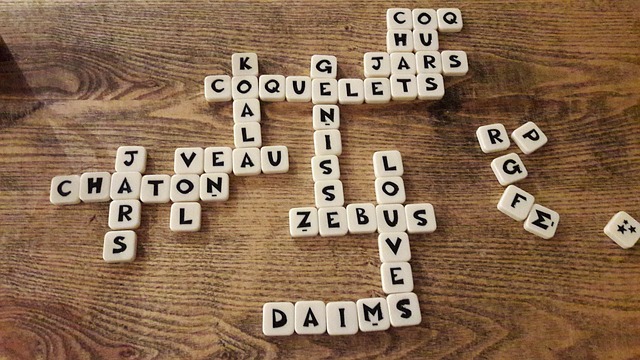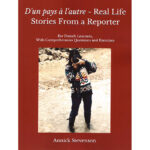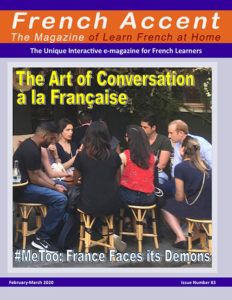One of the major challenges that drives many of our students crazy is that every noun has a gender in French! It has a to either masculine (masculin) or feminine (féminin).
Globally, there is no specific reason for it; the determination of its gender depends very much on its origin, with the suggestion that the word refers to something which is supposed to be more masculine or feminine. But it would be a loss of time to find any real logic. For example, why is boulevard masculine and avenue feminine? Why is virilité feminine and féminisme masculine? Why is malheur (misfortune) masculine and peur (fear) feminine? Why is magazine masculine and revue, which has exactly the same meaning, feminine? Idem for vélo (m.), and bicyclette (f.), which both mean bicycle, or for profession (f.), and métier (m.) which both mean profession, etc.
The question that all our students ask us is: How can one know or recognize the gender of a particular word? Unfortunately, most of the time they just have to try and memorize them, and to admit that they will always make mistakes, that the French will easily understand anyway. Still, there are a few rules or patterns that can provide some clues.
I. MASCULINE WORDS
1. The following endings are almost always masculine :
—”an”: an(year), écran (screen), océan (ocean), roman (novel), plan (plan), volcan (volcano), etc.
BUT there are a few exceptions, the most important one is maman (mum).
—”ou”: bijou (jewel), chou(cabbage), cou (neck), etc.
BUT there is one exception: une nounou (a nanny).
—”phone”: téléphone (telephone), magnétophone (tape recorder), etc.
EXCEPT for a word describing a person, in such case it is feminine when it concerns a woman.
Example: un anglophone, une anglophone.
—”in”: destin (destiny), sein (breast), terrain (piece of land), bain (bath), pain (bread), grain (grain), frein (brake), coin (corner), etc.
BUT there are a few exceptions, such as: une main (a hand), la fin (the end).
NOTE: Some of these words can become feminine by adding an “e” at the end, and the pronunciation changes as you can notice by listening to the audio link: un coquin, une coquine (a naughty person), le cousin, la cousine (the cousin).
—”age”: courage (courage), fromage (cheese), garage (garage), voyage (travel), ménage & nettoyage (cleaning), etc.
BUT there are a few exceptions, such as: la plage (the beach), une cage (a cage).
—”et”: alphabet (alphabet), arrêt (stop), projet (project), budget (budget), secret (secret), objet (object), etc.
BUT there are a few exceptions, such as une forêt (forest).
—”ment”: gouvernement (government), médicament (medication), vêtement (piece of clothing), etc.
BUT there is one exception: une jument(a mare — female horse).
—”eau”: bureau (office/desk), couteau (knife), tableau (painting), etc.
BUT there are two exceptions: l’eau (water) and la peau(skin).
2. The following endings are always masculine:
—”eu”: feu (fire), jeu (game), cheveu (hair), etc.
—”isme”: socialisme (socialism), capitalisme (capitalism), féminisme (feminism), etc.
—”al”: métal (metal), animal (animal), cheval (horse), journal (newspaper), festival (festival), etc.
—”er”: panier (basket), courrier (mail), baiser (kiss), etc.
—”ard”: cafard (cockroach, or depression), retard (delay), hasard (chance), etc.
—”oir”: couloir (hallway), trottoir (sidewalk), espoir (hope), etc.
—”ail”: ail (garlic), travail (work), corail (coral), etc.
—”eil”: sommeil (sleep), réveil (waking up), soleil (sun), conseil (advice, council), etc.
—”euil”: seuil (doorstep), fauteuil (armchair), écureuil (squirrel), etc.
—”ouil”: fenouil (fennel) — the only one with this ending.
3. Nouns with the following endings can be either masculine or feminine:
—”iste”: dentiste (dentist), garagiste (car mechanic), raciste (racist), féministe (feminist), activiste (activist), cycliste (cyclist), etc.
NOTE: They can be either masculine or feminine because they refer to the profession, the specialty or the personality of an individual. They always have the same spelling, but their gender depends on whether the person you are talking about is a woman or a man.
Examples:
– Jacques est un bon dentiste. = Jacques is a good dentist.
– Marie est une jeune activiste. = Marie is a young activist.
– Mon voisin est un vrai raciste.= My neighbour is a true racist.
4. In the plural: domination of the masculine
Even though old traditional ways of looking at things are changing, grammatically France remains a misogynist society. When you refer to a group of people, there only needs to be one man in the group for the entire group to be masculine when defining or describing it (we would definitely say ils and not elles when referring to the members of a mixed group).
This is the same for words. Each time you have an enumeration of words, if only one is masculine, the whole group will be masculine when an adjective is used to modify the group.
Examples:
—La robe, le manteau, la jupe et la veste sont bleus.= The dress, the coat, the skirt and the jacket are all blue.
—La maison, la cabane, le château et la grange sont habités toute l’année. = The house, the cabin, the castle and the barn are inhabited the whole year long.





 Improve your French aural comprehension, your French writing skills or your grammar knowledge. Communicate with ease and confidence when traveling in France… Our ebooks have helped thousand of French learners. Ebooks with audio, exercices, short stories, etc.
Improve your French aural comprehension, your French writing skills or your grammar knowledge. Communicate with ease and confidence when traveling in France… Our ebooks have helped thousand of French learners. Ebooks with audio, exercices, short stories, etc. Receive our French Learning e-Magazine for FREE!
Receive our French Learning e-Magazine for FREE!